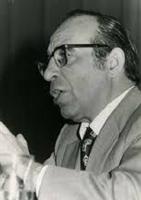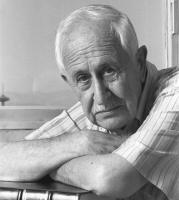Friedrich Albert Lange: biography of this German philosopher
Friedrich Albert Lange was a German philosopher known for his having tried to collect all the history of materialism up to his time and, furthermore, of having proposed reforms in the educational system German.
Not only did his life pass between the classrooms of the Gymnasium and German universities, but he also he dedicated himself to the political struggle working in opinion newspapers critical of how unification was taking place german.
We'll see now a biography of Friedrich Albert Lange, in addition to going into more detail about his thinking about how the educational process should be given.
- Related article: "Educational psychology: definition, concepts and theories"
Biography of Friedrich Albert Lange
Friedrich Albert Lange was born on September 28, 1828 in Wald, present-day Germany.to. He was the son of a Protestant theologian and dogmatic writer Johann Peter Lange. As a child he moved with his family to Langenberg, in 1832, and then to Duisburg. Then, in 1841, he would go to Zurich, where his father would take over the position of professor of theology that had been vacated by David Friedrich Strauss. Lange would study philology and theology in Zurich, especially the doctrines of Hegel and Herbart, as well as taking an interest in Kant while in this city.
In 1898 he moved to Bonn to study at its university., in which he would pursue higher studies in philosophy, German literature, analytical geometry and calculus. Later, in the year 1851 he would obtain a doctorate with his work on metric issues.
After having done his military service in Cologne, he went on to work as a teacher at an institute in the same city. and, from the year 1955, he became part of the faculty of the University of Bonn, working as “privatized”. In the year 1857 he began to offer lectures on materialism, however, unable to improve his position as a teacher in Bonn and having little success with his lectures on pedagogy, he decides to return to Duisburg and work in its Gymnasium (German high school).
In Duisburg he would teach Greek, Latin, German and philosophy. between the years 1858 and 1862, and it would be in this period that he would write several educational articles for the Enzyklopädie des gesammten Erziehungs und Unterrichtswesens by Karl Schmid.
But the life of Friedrich Albert Lange is not merely academic. Also he developed an important political activism, getting involved in the new consumer cooperatives and supporters of the unification of Germany.
He devoted himself to work for several months as a co-editor in the liberal newspaper “Rhein und Ruhrzeitung”, which was critical of Otto von Bismarck. In 1866 he joined the International Workers' Association, which would be known, with the passage of time, as the First International. A year later he would publish the first edition of his "History of Materialism."
In 1869 he joined the University of Zurich, where he obtained a position as a professor. However, he would later move to Marburg to practice this same profession. While in that city, in 1872, he was already beginning to show signs of illness, a cancer that would be responsible for his death on November 21, 1875.
It should be noted that despite his last years being ill, this did not prevent him from working on his work, trying to end in the second edition of "History of materialism", which would be published in two volumes published in 1873 and 1875.
- You may be interested in: "Types of Pedagogy: educating from different specialties"
Friedrich Albert Lange's pedagogy
Lange was always very interested in theoretical questions about what the purpose of education should be., and what was the best method to do it. In fact, even before starting to teach at a Gymnasium in Cologne, he was already considering what the method should be to reform the German educational system of his time.
He was especially concerned about the importance that was being given to the classics, too much, in his opinion, while the study of natural sciences was avoided, which were becoming increasingly important.
Despite his interest in this matter, and even having contributed to the writing of articles on pedagogy in the Encyklopädie des gesammten Erziehungs- und Unterrichtswesens by Karl Schmid, Lange does not seem to have had much of an impact on his contemporaries or on the history of pedagogy., despite the fact that his vision of it turns out to be something really interesting. When he started working as a “privatdozent” at the University of Bonn, he tried to give lectures on pedagogy, but unfortunately he failed to generate much interest in his students.
However, there are those who consider that this initial lack of interest on the part of Lange's pedagogy was temporary, since there are many great contemporary German thinkers of this philosopher who claim to have been influenced by his work. Among the most notable we find Max Weber, Friedrich Paulsen, Paul Natorp and Hans Vaihinger.
Friedrich Albert Lange stated that the purpose of education should be to ensure that students become rational and educated people once they reach adulthood. For this, it was necessary to take a retrospective look at the history of both education and pedagogy, and thus the keys could be obtained to achieve such a purpose. With the history of education, it would be possible to understand the way in which social, political and cultural conditions interact in a way that generates specific types of educational environments.
To get free citizens and act with great leadership it is necessary that the teachers themselves feel actively involved in their community. That is, teachers should not find themselves isolated from the political situation they are experiencing or by the sociocultural context that is taking place in their town or region. Only those teachers who are politically involved will be able to foster in their students a love of freedom and an appreciation of the mother country.
freethinking at school
Friedrich Albert Lange considered that a crucial aspect in a society that allowed free thought was that every social entity should have the right to decide what they want to teach at school. However, this does not mean that any type of ideology should be allowed. Lange considered that the state should restrict the appearance of depending on which school in case what is taught poses a real threat to the legitimacy of the state or promotes activities criminals.
Although Lange considered Christian values to be an essential part of education, he also he considered that there should not be a predetermined and unique religious instruction for all schools German. He considered that each school, and in the same line with respect to free thought and the themes to be taught in class, religion was to be chosen by those entities behind the overture of the school.
Lange considered Christian values to be an essential part of education, although he would later give more importance to the idea that philosophy acquired an important role in the achievement of an educational process effective. In addition, he ended up considering that the Christian religion should not be imposed, but rather
In Lange's pedagogical method it is argued that a balance must be sought between the natural talent of the student, that is, those strengths that he demonstrates, and the social stimuli coming from his family and community environment. He believes that the environment plays a significant role in the type of learning that the student demonstrates, and can help him to know how to focus and direct his learning abilities, especially in what he is given good.
He is critical of social Darwinism, as he thinks there is no need to pay attention to the barriers to development created by socioeconomic inequalities.
Bibliographic references:
- Lange, F. TO. (1857) Raumers Geschichte der Pädagogik, Neue Jahrbücher für Philologie und Pädagogik, 76: 107–133.
- Lange, F. TO. (1858), Die Prinzipien der gerichtlichen Psychologie, mit Berücksichtigung von Idelers Lehrbuch, Adolph Henke's Zeitschrift für die Staatsarzneikunde.
- Reichesberg, N., (1892), Friedrich Albert Lange als Nationalökonom, Bern: K. J. Wys.


